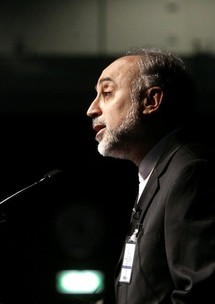Iran promises UN inspections 'soon' but no enrichment freeze
Jay Deshmukh
TEHRAN, Jay Deshmukh - Iran said on Tuesday that it will offer a timetable soon for UN inspection of its controversial new uranium enrichment plant but again rejected demands for a freeze on the sensitive process.
Atomic energy chief Ali Akbar Salehi said Iran is ready to discuss world concerns about its previously undisclosed second enrichment plant, but insisted there can be no bargaining about Iran's right to master the nuclear fuel cycle at long-awaited talks with major powers on Thursday.

But Salehi insisted the foreign concerns are "baseless" and said Iran will "try to resolve the issue both politically and technically by engaging with the P5+1 (the six powers) and the IAEA".
"We are discussing by phone and letters with the IAEA to reach an agreement for the date and way of inspection," he told international media in Tehran.
Salehi insisted there can be no going back on Iran's right under the nuclear Non-Proliferation Treaty to carry out enrichment for peaceful purposes.
"If we have the right to enrich uranium ... if we have the right for fuel production ... we will do this. We will not freeze them. This is our sovereign right," he said.
"We will not discuss about our rights (at the Geneva talks), but we are ready to discuss about nuclear disarmament and non-proliferation."
Uranium enrichment is the sensitive process that lies at the centre of Western concerns over Iran's nuclear programme, which Britain, China, France, Germany, Russia and the United States want the Geneva talks to address.
The process can produce the fuel for nuclear power or, in highly refined form, the fissile core of an atomic bomb.
The UN Security Council has imposed three sets of sanctions against Iran over its failure to heed repeated ultimatums to suspend enrichment.
Saleh said Iran is building a second plant because of the military threat hanging over its existing nuclear facilities. Both Washington and Iran's regional arch-foe Israel have refused to rule out military action.
"The site has been selected on purpose at a place that will be protected against an aerial attack. The site was chosen adjacent to a military base," he said.
He said the new plant is small compared to Iran's existing plant near the central town of Natanz, which has close to 4,600 active centrifuges enriching uranium.
"This is a contingency plant. It is to show our determination that in any case we will not stop our nuclear programme."
In London, Jane’s Intelligence Weekly said satellite images show the site undergoing significant excavation and construction and that it is surrounded by surface-to-air defence sites, military bases and a possible weapons test range.
Near the base, a slogan sixty metres (200 feet) long with fifteen-metre tall letters in Farsi can be clearly seen in satellite images, the publication quoted Alex Vatanka, IHS Jane’s Middle East senior analyst, as saying.
Washington has already expressed dissatisfaction with Iran's proposals for the Geneva talks, which focus on broader issues of global nuclear disarmament rather than its own programme in particular.
White House spokesman Robert Gibbs said on Tuesday the United States will bring up its concerns on Iran's uranium enrichment, even if Tehran refuses to discuss the issue.
"They may not, but we will," he said when asked whether US negotiators would bring up the issue of the newly revealed plant.
EU foreign policy chief Javier Solana, who has been the six powers' point man in the talks with Iran, said they will be seeking iron-clad guarantees that Tehran's nuclear programme is a peaceful one.
"I don't think that will be an easy task, but we are going to continue with our efforts," he said.
UN chief Ban Ki-moon said "the burden of proof" is on Tehran to prove its nuclear programme has no military dimension.
Iran's decision ahead of the Geneva talks to test two missiles capable of hitting targets inside Israel drew further Western criticism, with Washington describing the move as "provocative."
But Russian Deputy Foreign Minister Sergei Ryabkov said on Tuesday that it should not be used as a pretext for further sanctions.
-----------------------------------------------------------------------------------------------------------------------------------